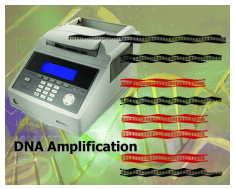Archival Notice
This is an archive page that is no longer being updated. It may contain outdated information and links may no longer function as originally intended.
Home | Glossary | Resources | Help | Contact Us | Course Map
DNA Amplification for Forensic Analysts
This course provides information in four lessons.
Amplification Overview. Learn the amplification process, from primer design to methods for optimizing the amplification process.
Locus Selection. Learn the established core STR and Y-STR loci used in the U.S., how those loci were selected, and common List STR kit manufacturers.
Multiplexing. Learn how multiplexing affects forensic DNA analysis; the components, instruments, and kits that make it feasible; and the historical development of forensic multiplex DNA kits.
Contamination. Learn to recognize the sources and minimize the risk of laboratory contamination, the processes that aid in the detection of contamination, and how to implement corrective action processes.
Taking the Course
Starting the course. Select the top link in the navigation on the right.
Navigating the course. We recommend you go through the course page-by-page using the Forward and Back buttons at the bottom of the page. You may skip around and select lessons using the navigation on the right.
Lessons
Information addressed in this interactive training program is delivered in two modules. Select a module below to begin.
| Lesson |
|---|
| Contamination |
Additional Online Courses
- What Every First Responding Officer Should Know About DNA Evidence
- Collecting DNA Evidence at Property Crime Scenes
- DNA – A Prosecutor’s Practice Notebook
- Crime Scene and DNA Basics
- Laboratory Safety Programs
- DNA Amplification
- Population Genetics and Statistics
- Non-STR DNA Markers: SNPs, Y-STRs, LCN and mtDNA
- Firearms Examiner Training
- Forensic DNA Education for Law Enforcement Decisionmakers
- What Every Investigator and Evidence Technician Should Know About DNA Evidence
- Principles of Forensic DNA for Officers of the Court
- Law 101: Legal Guide for the Forensic Expert
- Laboratory Orientation and Testing of Body Fluids and Tissues
- DNA Extraction and Quantitation
- STR Data Analysis and Interpretation
- Communication Skills, Report Writing, and Courtroom Testimony
- Español for Law Enforcement
- Amplified DNA Product Separation for Forensic Analysts


